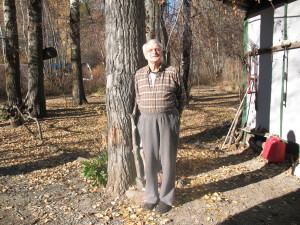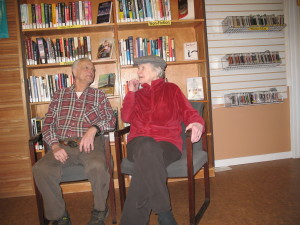When Richard Lubiak of Hedley was born in 1937, his Ukrainian homeland was already in crises. He and his mother were among the fortunate ones who escaped the escalating danger.

Richard called recently and said, “I have a story you might be interested in. Come for coffee”. Over a cup of delicious brew in his home near the Similkameen River he told his story. It’s a story of war, turmoil, and love for Ukrainian culture and people.
Richard began with a brief outline of a chaotic period in Ukrainian history. The Russians had a stranglehold on much of the country. They imposed collectivization of farms, imprisoned and killed millions, and engineered a devastating famine. Ukrainian men joined various militias to fight occupying powers.
“In the midst of all the turmoil and violence,” Richard said, “two soldiers in the Ukrainian Army became friends. They were fighting the Bolsheviks. One was my future step-father. The friend was Mr. Nesterenko, an artillery gunner. They fought against the Bolsheviks for the Czar, then against Russia and Poland.
The Ukrainians’ plight deepened with the advent of WWII. In June, 1941, Hitler began his drive toward Moscow by invading Ukraine. Initially many saw the Wehrmacht as liberators. Some joined Nazi units.
“The region where my family lived was under Polish rule and here the Germans were good to us,” Richard said. “It didn’t take long though, for people in other areas to decide they were only slightly better than the Russians.” The Germans forced Ukrainian men to work very hard. They pulled children off the streets and sent them to Germany to work.
Approximately 10 million Ukrainians were killed.
“When the Russians started pushing the Nazis back,” Richard said, “the retreating army destroyed everything the communists had left when they were driven out.” Fearing Stalin’s troops, about 2 million Ukrainians fled with the Wehrmacht.
Richard was 6 when he, his mother and other relatives, hid in a root cellar behind German trenches. He was lying on his grandmother’s lap when a Russian bullet hit her in the abdomen, killing her.
At this time, Richard’s father was in one of the militias, fighting Russians and Poles. Because his mother was a nurse, the Wehrmacht took them along.
“They put us in a Displaced Persons camp” he said. “Our people kept the camp clean and organized. They set up schools.” He still feels pride at the way Ukrainian people responded to difficult circumstances.
For 11 years his mother looked for his father. Eventually the Polish Red Cross informed her he had been executed by the Russians.
“In this camp mother met my step father. They were married and in 1949 we emigrated to Toronto. There was a substantial Ukrainian community and an Orthodox Church.”
In the upheaval of the war, Richard’s step-father had lost contact with his friend, Mr. Nesterenko. The man had emigrated some years earlier. It was a moment of great joy when they met again in the Orthodox Church.
“Our families spent a lot of time together,” Richard recalls, “the Nesterenkos had two children. Often we went to their cottage at the lake.”
When Mr. Nesterenko died, the families drifted apart. “I didn’t see them again. In 1958 I married Margaret, a Ukrainian girl, and in 1979 we began a new life in BC.
Richard sold cleaning products and Margaret ran their janitorial business. For 9 years they also operated a B&B in Princeton. In 2007 they moved to an idyllic setting just east of Hedley. Sadly, after a heroic battle with cancer, Margaret passed away this summer.
An avid reader, Richard continued their practise of visiting the Hedley library each Thursday. On a white board showing whose book requests had come in, he was astonished to see the name Nesterenko. Remembering his step-father’s friend, he made inquiries and learned that Natalie, the daughter of the friend, was a resident of Hedley.

They met the next day and for both it was a moment of profound joy. The Ukrainian culture is deeply rooted in them and they will have much to talk about in coming days.
The 2 Ukrainian soldiers could not have known that some 60 years later their friendship would bring about another friendship, in possibly the most unlikely of places.

One thought on “Ukrainian Friendship”